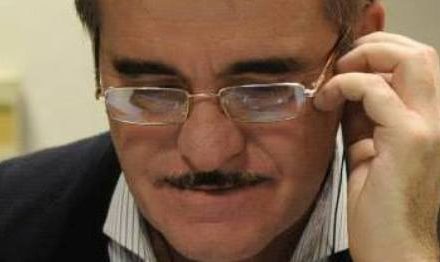Germans feel that crises do not affect them, Axel Troost said, interviewed by Kaki Bali for the Sunday edition of Avgi newspaper (10.09.2017). Troost, member of the Bundestag and deputy chairman of Die Linke (The Left) Party, has an active interest in Greece, manifested in his frequent articles and his paper “The facts about Greece’s policy: What Greece has actually done to deal with the crisis”. On September, 9, die Linke with European United Left/ Nordic Green Left European Parliamentary Group (GUE – NGL) organized an event tittled “Solidarity against Austerity! – Solidarity with Greece” in which Troost and Alternate Minister of Foreign Affairs, Giorgos Katrougalos, among others, participated. In his interview Troost analyses the stakes of the German elections and the ability of Left to formulate its own proposals for overcoming global crises, or forge alliances at European level.
We have the feeling abroad that nothing is changing, that people in Germany don’t see an alternative to Angela Merkel, and that they don’t wish for any other alternative. Is that true?
Unfortunately, there is no mood for change. People realize that there are many crises around the world: political crises (Trump, Brexit, Turkey…), military crises (North Korea, Ukraine, Middle East), financial crises (Southern Europe), the migrant flows etc, but still, they do not feel the crisis in their daily life. The situation in Germany appears good, given that with the high tax revenuesand the low interest rates, the Government has attained unexpected surpluses with which it can finance other needs. In the opinion of many Germans, Chancellor Merkel and her Government are keeping the crises away and guaranteeing their well-being. On the other hand, it is not that easy for the people to comprehend the crises, because there are so many crises and conflicts that can hardly be rationally explained, and people have to decide according to their personal feelings and the development of their personal living conditions.
What do you expect from the 2017 federal elections? What do you wish to change and how will you convince the people?
We wish to achieve a better result than the 8.6% achieved in 2013 so as to be the third Party in the Parliament again. Therefore, if there’s a coalition government again, then we will be the biggest Party in Opposition. There are people in Germany who suffer because they are unemployed, they have bad jobs, they suffer old-age poverty. Τhere are also many people who are unhappy because they have to reorder their lives according to social pressures or employer demands, and wish to be emancipated. We work for social justice, for a strong community of solidarity, and last but not least, we are the only Party in favour of Peace and Disarmament.
When Martin Schulz was declared SPD candidate, an intense discussion began regarding a “red-red-green” governing Coalition (SPD, Die Linke, Die Grünen). Is there any point to this discussion today, just before the election?
Martin Schulz was the surprise pulled out of the SPD hat. As former Speaker of the European Parliament, he came from abroad (and not from the Federal Government), on whom many people projected what they wished to see, a different another SPD of which they had great expectations from. In opinion polls, the SPD had reached 10% and thus a “red –red –green” option then seemed a feasible one.
Subsequently however the SPD lost in the regional election and is now lagging as far behind the Christian Democrats in the polls as it did before Schulz’s nomination. In terms of polling average, the “red-red-green” Coalition (the Social Democrats, the Left and the Green Party) appears to secure about 40% of the vote, while the Union (Christian Democrats) and FDP around 48%, so the numbers do not add up. The SPD could still perhaps close that gap with an aggressive election campaign for the “red- red- green” Coalition, but neither Schulz nor the rest of the SPD leadership seem committed to do so, given especially that only but a few remain committed Leftists in the SPD. Moreover, many of the Green Party would rather be in government the Union than with “Die Linke”, with which they have problems.
Supposing that the voters give you the chance, would you be ready to participate? And under what conditions?
If there was to be a “red-red-green” majority (SPD, Die Linke, Die Grünen) then we would seriously negotiate such an alliance. There would be obviously be no agreement to be in government at any cost. An important condition for us would be the reintroduction of a wealth tax, which has not existed in Germany for the past 20 years. We would not agree to any military interventions of the German armed forces. We would also introduce improvements to social benefits and pensions.
Global problems, such as wars, migration, injustice, changes in employment due to digitalization etc. demand global solutions, and Internationalism was always a part of the Left. Can you see the Left formulating its own proposals for overcoming global crises, or striving to forge alliances at European level?
The Left has always been talking and arguing about these issues, and still insists that we need a different international financial order, a different policy for Peace, for the Environment, for Growth. To this purpose, there many and varied approaches that need to be further developed by all Left Parties together with social movements, NGO’s and other allies. Ideologically speaking, Neoliberalism has lost its charm some time now but continues to be strong, whilst lately there have been more and more authoritarian and nationalist political approaches. This is a challenge for us; I am all in favour of international cooperation and also believe that we are in need of institutions that would replace the neoliberal ones. I believe that Europe should play an important part in the solution of global problems, but this could only happen in the near future only through the EU.
The EU is in deep political and economic crisis but I don’t think we should break it down in the belief something new would emerge from its ruins that could meet our expectations. I believe that instead we should reform the EU. It is very important that we restructure the Monetary Union so that the common currency unites rather than divides Europe. To this end, I have, along with others, elaborated very specific proposals that I am willing share and discuss. An exchange of opinions has to a point already begun. Instead of austerity we propose a European Investment Programme, a common lending policy, the decrease of economic imbalances from countries with surpluses such as Germany, the strengthening of the EU’s social dimension and the democratization of the EU with an upgraded European Parliament.
Read also: Restart Europe Now: Re-seeking employment, solidarity, prosperity, A Europe built on solidarity is possible; What Greece has actually done to deal with the crisis: Common beliefs and their refutation, Syriza wollte Einschnitte mildern Interview mit Axel Troost (26.4.2017)
F.K. & A.P.













